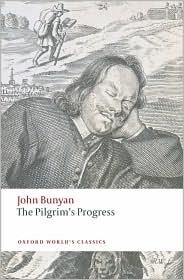STUDY SESSION 7
Introduction (pp. 95-115)
At this point, Hopeful joins Christian after Faithful is killed. On their journey, they encounter “By-ends” and several other men. They end up being captured by Giant Despair.
Readers
Narrator (95) – normal amount
Christian (97) — normal amount
Hopeful (97) — normal amount
By-ends (97) — a large amount
Mony-love (99) — a good amount
Mr. Save-all (99) — short
Mr. Hold-the-world (100) — short
Demas (104) — short
Vain-Confidence (108) — one line
Giant Despair (109) — little
Mrs. Diffidence — little (means a lack of faith or confidence, mistrust, distrust, doubt, etc. and not reticence as it is now used, see † 304).
Vocabulary
By-ends († 97) = “a ‘by-end’ is a secondary consideration” (303)
Fainings (97) = feigning’s = pretender, disguiser
Conje (99) = conge, a farewell, a ceremonious bow, a formal permission to depart (Webster)
Save-all (99, see †) = “a miserly person who saves all his money. Bunyan may also intend this character to represent the belief that Christ died for all, not only the elect.” (303)
Gripe (99) = a covetous man, one who grasps and clutches tightly
cousenage (99) = cozenage (pronounced “cousin –eej”) the art of cheating, fraud
ridged (99) = rigid
benefice (101) = an ecclesiastical office which is funded by an endowment
stalking horse (102, see †) = a proverbial saying (?)
Lucre (103) = monetary gain; profit (often used negatively “filthy lucre”)
surfeit (107) = means excess, effects of excess
stile (108) = a step or set of steps for passing over a fence or wall (a small ladder)
rate (110) = to rebuke angrily or violently (berate)
halter (110) = a rope with a noose for hanging a person
Questions (pp. 95-115)
Page #
96 Christian and Hopeful enter into a “brotherly covenant.” What do you think that means? Is it a good thing? Would it help us in our generation? Why or why not?
97 Describe the kind of family from which By-ends comes. What kind of picture is he trying to paint?
98 How is he different from the “stricter sort” of religious people? Explain what he is saying.
98 How did By-ends get his name?
99 How does By-ends describe Christian and Hopeful? Why? Does this happen often?
100 By-ends understanding of the Christian walk is all wrong. What kind of people would make this statement? Explain how one can argue By-ends case.
100 Mr. Mony-love believes they have Scripture and Reason on their side. How would he come to that conclusion?
101 Explain By-ends’s question?
102 NOTE: See Jn. 6:25ff. Christian gives good examples from Scripture. By-ends and his friends could not answer and yet, they thought before they had a good case. Being convinced by something doesn’t mean you are right! It must be in accordance with Scripture.
104 Who is Demas (2Tim. 4:10)? Are there men and women like him in the church today?
104-5 Why would it have been wrong for Christian and Hopeful to accept Demas’s invitation? Isn’t an effort to make a profit legitimate?
106 What made Hopeful different from Lot’s wife? Hopeful wanted to go into the Silver-mine whereas Lot’s wife only turned and looked – what was the difference between the two? How helpful was Christian in preventing Hopeful? What can we learn from him?
109 Why didn’t Hopeful express his disagreement with Christian more forcefully?
110 Giant Despair suggests that they commit suicide. Why would some Christians actually consider that?
114 How did they escape Doubting Castle?[1] How do we get the same key?
Observations & Notes
BROTHERLY COVENANT (97)
Puritans often covenanted with each other as well as privately before the Lord. This was their holy resolve to pursue godly matters. Some times, they wrote down their covenants with God.
RIVER OF GOD (107)
“…Pilgrims, having been enabled to resist the temptation to turn aside for lucre, were indulged with more abundant spiritual consolations. … All believers partake of this sacred influences [of the Spirit], which prepare the soul for heavenly felicity, and are earnests and pledges of it: but there are seasons when he communicates his holy comforts in larger measure; when the Christian sees such glory in the salvation of Christ… forgets, for the moment, the pain of former conflicts and the prospect of future trials; finds his inbred corruptions reduced to a state of subjection, and his maladies healed by lively exercises of faith in the divine Savior… Then communion with humble believers, (the lilies that adorn the banks of the river) is very pleasant; and the soul’s rest and satisfaction in God and his service are safe, and his calm confidence is well grounded…” The writer takes these to be the “abundant consolations of the Spirit” (T. Scott, 150-151)
[1] “The promise of eternal life, to every one without exception, who believeth in Christ, is especially intended by the key; but without excluding any of other of ‘the exceeding great and precious promises’ of the gospel” (Thomas Scott, 162).
